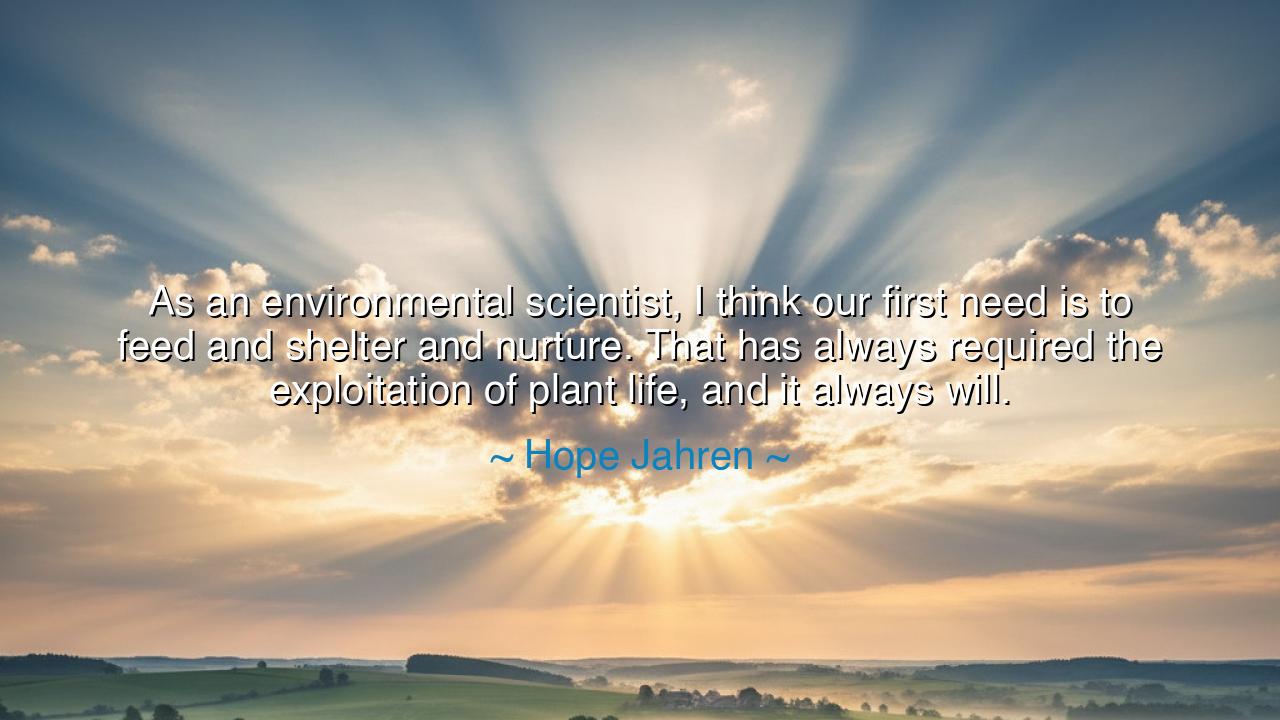
As an environmental scientist, I think our first need is to feed
As an environmental scientist, I think our first need is to feed and shelter and nurture. That has always required the exploitation of plant life, and it always will.






Hear the words of Hope Jahren, who peers into the very roots of life, and proclaims: “As an environmental scientist, I think our first need is to feed and shelter and nurture. That has always required the exploitation of plant life, and it always will.” These are words of humility and truth, spoken not to condemn humanity, but to remind us of the eternal covenant we share with the green world. For from the beginning of time, when humankind first rose from the dust, it was the leaf, the fruit, and the seed that sustained us.
In this saying, Jahren teaches that our survival is bound to the sacrifice of plants. We may forget, in our cities of stone and steel, that every loaf of bread, every roof beam, every thread of cloth once grew silently under the sun. To feed and shelter is not merely to consume, but to recognize that life is always built upon life. The earth has never been our possession; it has been our companion, our provider, and at times, our victim. Jahren speaks of exploitation not to glorify it, but to acknowledge its inevitability—so that we might carry it out with reverence rather than greed.
Consider the story of the Irish potato famine. For generations, the people of Ireland leaned heavily upon the humble potato, a gift of plant life brought from distant lands. It fed the poor, it sustained families, it sheltered their bodies against hunger. But when blight struck and the crop failed, millions suffered, starved, and scattered across the world. This tragedy reveals the fragile thread that ties us to plants: when the green world falters, human life falters with it. Here is the living proof of Jahren’s words—that to nurture humanity, we must honor the lives of plants, for our fate is entwined with theirs.
From ancient times, too, this truth has echoed. The cedar of Lebanon built temples and ships, raising civilizations to glory, yet the forests vanished beneath the axes of kings. The maize of the Americas sustained empires, yet demanded careful tending lest the soil be stripped bare. Again and again, humankind has leaned upon the gifts of the green kingdom, and again and again, we have been reminded that our exploitation must be tempered with wisdom. To take without care is to invite ruin; to receive with gratitude is to sustain life.
Jahren’s words call us to balance. She does not deny our need to feed, to shelter, to nurture; she acknowledges it as eternal. But she reminds us that how we take from plants defines the future of our children. To exploit without thought is to starve tomorrow. To exploit with reverence—with sustainable harvests, with replanting, with conservation—is to honor the covenant of life. We cannot escape dependence, but we can shape it with humility.
The lesson, then, is clear: live as stewards, not as conquerors. Remember, every meal you eat is the gift of plant life. Every chair you sit on, every book you read, every shelter that protects you from storm—all flow from the silent labor of roots and leaves. Do not treat these gifts as endless, for they are not. Plant where you have taken, restore where you have consumed, and waste nothing that has been given.
In your own life, let this wisdom take root. Grow something with your own hands, even if only a single pot of herbs by your window. Respect the food you eat, knowing it was once alive. Support farmers who honor the land, and turn away from practices that strip the soil bare. Teach children that bread does not come from markets but from fields, from seeds, from the patience of the earth.
So remember, O listener: to live is to take, but to live well is to give back. Honor the truth of Hope Jahren’s words—that we will always exploit plant life, for it is our sustainer. But let our exploitation be wrapped in reverence, gratitude, and care, so that both humanity and the green world may endure together, not for a season, but for generations without end.






AAdministratorAdministrator
Welcome, honored guests. Please leave a comment, we will respond soon